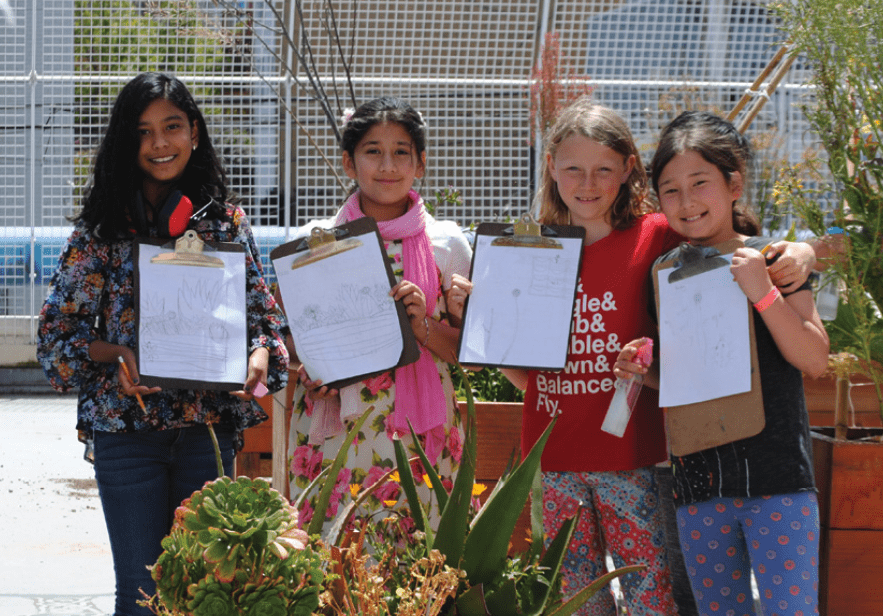The Climate-Resilient California Schools – A Call to Action report, released last week by the Climate Ready Schools Coalition, shows school communities have a critical role to play in addressing climate change. Greening our career education system is a crucial step in this transformation, and members of CAELI’s Green Career Education Innovation Hub set out to share this message at last week’s annual Educating for Careers Conference in Sacramento.
Kirk Anne Taylor, CAELI Green Career Education Innovation Hub member and executive director of Climate Action Pathways for Schools said, “Expanding green career education is a win-win-win. Students gain valuable career skills while helping their school districts address climate change. Students gain skills that help them today while preparing them for their future. School districts can save money, and communities across the state can become healthier and more climate-resilient.” This sentiment was a core part of the presentation, which also included a strategic listening and feedback component to the workshop, so participants could find out more about why this win-win-win situation isn’t happening already.
During their conference session, CAELI members launched the public information-gathering phase of its Green Career Roadmap project. The team explained how the project would help create a data-driven strategic plan to secure equitable access for TK–16 students to high-growth, high-quality green and blue careers essential to a sustainable future. Session participants were asked to describe their current successes and challenges and then help envision what a coherent and inspiring K–Career pipeline might look like and describe milestones along the way that would indicate we are on the right path.
Roadmap educator input session at Educating for Careers.
What became clear from the feedback session is that despite students across the state yearning for more meaningful and empowering instruction and employers facing a silver tsunami of retirees in key climate-related industries, the TK–12 (or in this case TK–16) system is struggling to connect kids to green and blue careers.
“Maybe this is what we need to do, just sit in a circle and listen to each other,” said Catherine Paine, career technical education (CTE) business teacher with Santa Rosa City Schools. “I’m thinking, after seeing how this session was facilitated, that these are the conversations we need to have now.” Bringing folks together, as Paine describes, is especially important in the highly complex and decentralized career education space. Unlike many academic subject areas, which are held together over time by statewide curriculum frameworks, standards, and assessments, successful career programs are informed by local advisory boards representing swiftly evolving regional economic drivers.
Roadmap educator input session at Educating for Careers.
Other input shared was that much of the outstanding work in this field has to be done against the grain of the system by maverick teachers working way above and beyond rather than from within it. Too many teachers are juggling overwhelming competing priorities, making it challenging to institutionalize green and blue career education system-wide. Adding to that challenge, participants shared that real, future-ready learning involves embracing complex, real-world issues—and that to do so, the very structure of most public schooling needs to be updated. The good news is that this is possible. For example, many educators in multiple sessions advocated for a block schedule allowing for more in-depth projects, including field trips and collaboration with community-based partners and local businesses.
There was also a strong understanding that this type of learning is interdisciplinary and that teachers do best when they have time to collaborate across subject areas within the school day. Conference presenters from the Edison High School’s Green Energy Academy in Fresno and the Green Technologies Academy in Oxnard helped participants understand how the California Partnership Academies can be a model for larger reforms in this area, as the program helps fund and arrange shared prep periods for grade level teaching teams. While not easy from a master scheduling point of view, such changes are entirely possible and have proven to help more teachers do far deeper work with their students. These models also improve teacher satisfaction and retention and reduce burnout—key elements to a strong teacher workforce.
Mark Basnage, who is helping to lead the Roadmap project said, “My takeaway from the small group discussions is that there are lots of people working in schools who are eager to help move green career efforts forward in their schools and to engage in the broader conversation. From the participants who attended, it was also clear that people in different parts of California’s vast education ecosystem have deep knowledge and passion about sharing their knowledge and participating in creating equitable and just green career pathways for all of our students.” Mark shared, “In my small group, we had valuable suggestions about specific resources that can be useful to folks at different levels—from students to teachers to county offices of education. The event was a powerful affirmation of the work we’re setting out to do with the roadmap and other tools for the state.”
Emily Courtney, the Roadmap project lead, reflected, “I often think that teachers are afraid to alarm or demoralize their students by teaching about the environment because we’re concerned that the scope and scale of the solutions we offer are insufficient to address the scale of the problem. Teaching students about the opportunities created by environmental challenges—job and entrepreneurship opportunities—can help all teachers embrace teaching environmental literacy. I felt energized to be at the conference with a room full of teachers who are supporting their students to develop career pathways that address environmental challenges while providing living wages in growing occupations that are truly meaningful.”
Above all, the workshop confirmed that there are many outstanding green career educators and programs in California, and the Green Career Education Innovation Hub’s roadmap team wants to know more about them. Doron Markus, Roadmap team member, said, “I was elated to see so many educators who are dedicated to promoting green career education among K–12 students within the same space, sharing their knowledge, experiences, and passion. We understand how critical it is that California prepares its youth for the good green careers and jobs that will be available to them once they enter the workforce, and I am hopeful that this movement will gain momentum in the coming years as a result of the Roadmap and the dedication of green educators everywhere.”
To get a jump start on finding these folks across the state, the team drafted the Roadmap to A Green Economy Education Survey. Please help spread the word, and if you know of green and blue career education efforts throughout the state, please indicate this in the survey. Sharing the survey with your networks will help the working group team recruit more educators to serve as paid subject matter experts who will help create the roadmap and build on the great work launched at the Educating for Careers Conference.









